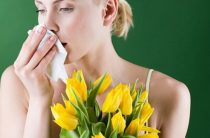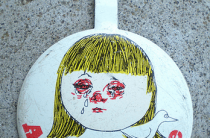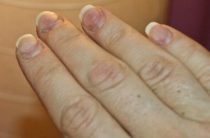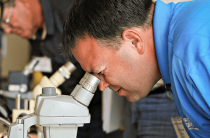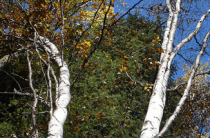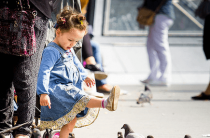With the first rays of spring warmth, we wake up from the cold and hibernation. But not everyone is waiting for the arrival of spring. With the current ecology, our body is weakened, the immune system does not work at full capacity. Because of this, allergies occur. In particular, allergy to plant pollen. The patient needs to limit himself in almost everything.
Flower allergy symptoms
An allergy is an increased sensitivity of the body to external and internal stimuli. This type of allergy begins with a banal cough and runny nose, which are not given much importance. This disease is cumulative. That is, the allergen is already in your body, but has not yet manifested itself. And then it just explodes with a lot of symptoms.
To cough and rhinitis, in the future, runny nose, lacrimation, itching will join. The disease is accompanied by skin rashes and irritations, as well as breathing problems (shortness of breath, asthma attacks). There are cases of elevated body temperature. In severe cases, nausea and vomiting may occur.
Causes
The body gives such a reaction as a result of its contact with the pollen of flowering plants. Harmful are those plants that are pollinated and propagated by the wind. The cause of this disease can be the flowering of the following plants:
|
|
The list can be continued indefinitely. Among indoor flowers, the main pest is geranium. Allergies can be transmitted at the genetic level. If the mother suffered from allergies during pregnancy, then in 95% of cases this disease is transmitted to the child.
Pollen allergy can occur in addition to a disease such as bronchial asthma, or to an already existing allergy of another kind. Employees of large enterprises working with various chemicals fall into the risk zone. These substances irritate the mucous membranes of the nose and eyes and make them vulnerable to pollen. People who are prone to emotional upheaval and stress are also at risk. And do not forget about pregnant women, whose immunity is weakened during this period.
Allergy preparations for flowering
How to get rid of pollen allergy once and for all? Many people ask this question. Before starting treatment, you need to diagnose the disease. After all, it is difficult to identify the “correct” allergen from the mass of possible ones. For this, allergists prescribe various tests: skin tests, blood tests. After identifying the allergen plant, it is necessary to stop all contact with it.
There are a large number of antihistamines for allergies that are sold in pharmacies without a prescription. These drugs fall into three categories: first, second and third generation drugs.
First generation antihistamines: suprastin, diazolin, tavegil, ketotifen and many others. Very often, it is with seasonal allergies that doctors prescribe Diphenhydramine. It relieves allergic manifestations well, but is harmful to the nervous system. Reactions such as urinary retention are possible.
All these medicines relieve allergy symptoms quickly, but only for a short time. They have a fairly large list of adverse reactions, including relaxation of muscle tone, dry mouth, fatigue, drowsiness. In this regard, it is contraindicated for people working behind the wheel or for students and students. This category is the oldest.
The second category of drugs is more modern, improved copy of the first generation. They do not have a hypnotic effect, the effect of taking drugs persists for a long time. Not addictive. These include:
| Claricens | It improves well-being, relieves redness of the skin, relieves rhinitis. It is prescribed both for treatment and for preventive purposes. Does not cause drowsiness. The result from its reception comes almost immediately and lasts throughout the day. Among the side effects, a possible headache and individual intolerance to the components of the drug are distinguished. |
| Claridol | Eliminates urticaria, rhinitis and conjunctivitis. Effectively relieves itching. With timely use prevents the appearance of puffiness. It does not affect the central nervous system in any way. In rare cases, after taking Claridol, nausea and vomiting may occur. |
| Clarotadine | Removes allergic manifestations quickly and permanently. Does not cause drowsiness, may cause dermatitis, frequent urination, cough |
| Lomilan | It relieves itching and helps with acute rhinitis. Within a short time removes swelling of tissues, acts throughout the day. Does not cause drowsiness and does not affect the nervous system. Rarely, headache and nausea may occur. |
| Claritin | It is prescribed by doctors for allergic rhinitis, bronchial asthma and conjunctivitis. Removes all these symptoms in the shortest possible time. Highly effective drug. Among the adverse reactions, individual intolerance to individual components of the drug can be noted. |
| Kestin | Recommended for allergic symptoms such as rhinitis, conjunctivitis, urticaria. The effect of the reception lasts for a long time - about two days. May cause insomnia, nausea, headache. |
There are third generation drugs. These are the latest drugs. They do not cause any sedative effects, therefore it is allowed to apply to people whose work requires a high concentration of attention. They also do not have any side effects on the cardiac system. These include:
| Trexil | Relieves symptoms of allergic rhinitis, dermatitis, urticaria. Allowed for people suffering from various chronic diseases. If it exceeds the recommended dosage, the following reactions may occur: skin rashes, nausea, vomiting |
| Hismanal | It is an effective tool in the fight against seasonal allergies. The result of the drug appears in the first hours of admission and lasts up to two weeks. Does not cause drowsiness or fatigue. May cause increased appetite and tachycardia if recommended dosage is exceeded. |
| Zyrtec | An excellent helper for itching, hives, rhinitis, asthma and conjunctivitis. Prevents the occurrence of edema. If used incorrectly, dizziness, headache, migraine may occur. |
Preparations of all these three groups are used to treat allergies to flowering in children. The first generation is good because the effect comes quickly and the drug is also quickly excreted from the body without being absorbed into the blood.
Among them, children are allowed: Suprastin, Tavegil, Diazolin. But you should be careful in using them, as they can provoke constipation, headache, drowsiness, lack of appetite, urinary retention.
The second generation drugs rarely cause drowsiness and last longer. These include Erius, Tsetrin, Fenistil. They have a fairly small list of adverse reactions: a negative effect on the cardiac system is possible. In chronic allergic reactions, children are allowed to use third-generation antihistamines: Gismanal, Terfen. They have no side effects.
Allergy to plant pollen is quite difficult to cure. Common symptoms such as runny nose, sneezing, nasal congestion can be relieved with nasal drops. Drops and sprays are also divided into groups: antihistamine, vasoconstrictor, hormonal, immunomodulating drops, combined. There are a large number of preparations for washing the nose.
| Antihistamine drops and sprays | |
| Spray Kromoheksal | It has a pronounced anti-allergic effect. Relieves itching. The drug is contraindicated during pregnancy and lactation. Also in case of intolerance to its components. |
| Spray Levocabastin | Indicated for patients with seasonal allergies. Eliminates rhinitis, nasal congestion. Contraindicated in children under 6 years of age and women during lactation. Side effects include headache, drowsiness, anxiety, nausea and tachycardia. |
| Spray Allergodil | Allowed to use for a long time. Effectively eliminates the symptoms of allergic rhinitis. Children are allowed from the age of six |
| Drops Fenistil | These drops relieve any manifestations of pollen allergy (conjunctivitis, rhinitis, urticaria, itching). It should be noted that this remedy is allowed for children from 1 month |
| Vasoconstrictor drops | |
| Drops Nazivin | Recommended for acute rhinitis, relieves swelling of the nasal mucosa. During pregnancy, it is not recommended to exceed the recommended doses of the drug. |
| Drops Naphthyzin | When using this drug, swelling of the nasal mucosa is significantly reduced, breathing with rhinitis is facilitated. Children are allowed to use from the age of three. Follow the dosage of the drug and do not exceed it. Allowed to take for a short time |
| Oxymetazoline drops | They have a positive effect in the first minutes after application. Relieves nasal congestion, protects the mucous membrane. In the right dosages, it is allowed for children of any age. |
| tramazolin | From the first minutes restores normal breathing and keeps it for a long time. Does not irritate mucous membranes. Allowed for children over 6 years of age |
| Hormonal drops | |
| Benacap | Improves respiratory functions. Eliminates shortness of breath and coughing fits. Recommended for patients with bronchial asthma. Pregnant women are allowed to use only under medical supervision. Children are allowed at least seven years old |
| Spray Avamys | Has anti-inflammatory action. Treats allergic rhinitis. Allowed for children over two years old. Contraindicated in people with impaired liver function. During pregnancy and lactation, it is allowed to use only under medical supervision. Among the side effects are the appearance of a rash in the form of urticaria, Quincke's edema, tachycardia |
| Nasobek | Well eliminates swelling of the nasal mucosa. Reduces mucus secretion. Well tolerated during long-term treatment. Possible irritation and burning after application. It is contraindicated for use by persons suffering from infectious and viral skin diseases, women in the first trimester of pregnancy, children under six years of age. Doctors do not recommend taking this group of drugs for a long time, since a small amount of hormones is absorbed into the blood. They can be addictive |
| Immunomodulatory drops | |
| Derinat | Stimulate the production of the necessary parts of the immune system. It has the property of healing the nasal mucosa and moisturizes it. Creates a barrier to the penetration of allergens. Recommended for allergic diseases of the upper respiratory tract. Children are allowed from birth |
| IRS 19 | Great for boosting immunity. It is recommended in the treatment of acute rhinitis, respiratory diseases, bronchial asthma. The drug envelops the nasal mucosa, thereby preventing the reproduction and penetration of pathogenic substances into the body. It is prescribed for children from the age of three months. It is not recommended to use this remedy during pregnancy and lactation. Rare side effects such as nausea, vomiting, headache, diarrhea, urticaria |
| Combined drops | |
| Galazolin | The drug quickly and effectively relieves swelling of the nose, congestion. The action time reaches 6 hours. Recommended in the treatment of allergies to flowering plants. The tool is contraindicated for use by people with diabetes mellitus, atherosclerosis, glaucoma |
| Vibrocil | It quickly and permanently relieves nasal congestion in allergic rhinitis. Approved for use by young children in the indicated dosages. Not recommended for pregnant women |
Means for washing the nose:
- The simplest and most effective remedy is saline;
- Aqualor;
- Aquamaris;
- Otrivin;
- Morenasal.
The composition of such preparations includes only sea water, which effectively flushes the airways and frees the nose from mucus. Medicines of this group are allowed to be used by everyone: children, people suffering from chronic diseases, pregnant women.

